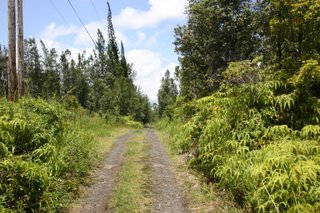
Raphael and I moved to the Big Island about a month ago. We own two lots of land in the Puna area (in case you want to check out a map). It is very rural here, rugged, and fairly unregulated by the government - housing may or may not have permits, most roads are privately owned and look like this one on the right (which happens to be the road one of our lots is located on - thats our lot there on the left), many many people use catchment for water and solar for electricity. Many more don't have any utilities at all.
We are both English teachers here (though Raph is trained as a science teacher) and are still getting acclimated to the culture in this area. Our school, Pahoa, has a reputation for being a tough school and many of our coworkers talk to us as though we won't stay, because soooo many teachers have come and gone each year. When other teachers ask me how I'm doing, and I answer "great," they seem fairly shocked. "Really?" They say.
Maybe it is because I taught on Maui before, and so the Hawaii school system isn't totally foreign to me. Maybe it is because I've also worked with inner-city students in Pittsburgh through jobs at the Pittsburgh Children's Museum, and the Manchester Craftsmen's Guild. (Not trying to make it sound like a resume, but both places are pretty awesome and I love to say that I've worked with kids there.) But the truth is, thus far I have nothing negative to say about my students.
They face some pretty incredible challenges. For example, Puna has more kids in foster care than anywhere else in the state. I hear many students talking openly about running away from their foster parents, or being switched around from Auntie's house, to grandma's house, to foster parents. It's pretty remarkable that they can keep up with school at all. They also have a
HUGE crystal meth epidemic in Hawaii (ice as it is known here). These two problems aren't unrelated. Drugs permeate the culture here. In the 70s when there were only 55 students graduating each year from Pahoa, guerilla farmers had huge crops of marijuana growing on this lush mountain-side. That remains here in the culture. When talking about utopian societies in class the other day, I asked students to identify problems in our society that we'd need to fix in order to make a utopia. One boy's response was "green harvest," which I'd never heard of. Apparently it refers to when the authorities cut down your marijuana crop. According to my student, this is a problem because when they harvest a person's marijuana, they are driven to take ice. Interesting logic, huh?
Despite these challenges, my students are very bright, have incredible senses of humor, and want to learn. I like EVERY student I have, which I couldn't say on Maui, even though I did like the vast majority there too. I'm excited to teach, though the job is limitlessly challenging, and indeed the only thing that I feel has truly challenged me in my whole life. I think about the job that I held for the last year at the Manchester Craftsmen's Guild. An incredible place. Amazing people working there. And yet, I wasted so much time as an employee there. Not that I didn't complete my job, but I did it efficiently, and was left with so much extra time to visit the coffee maker, the studios, glaze a pot, dye some fabric, talk story (as they say in Hawaii) with a friend. Luxuries not afforded to me as a teacher. And yet, I feel so much more energized as a teacher. I feel like I make a difference to those students. I feel like my day's work matters. And I'm being challenged daily, which I believe is good for the soul, the intellect and the body (as long as it isn't too extreme.)
I'm thrilled to be here, though this wasn't at all what I had intended to write about. It is what it is, and I'll just go with that for now.